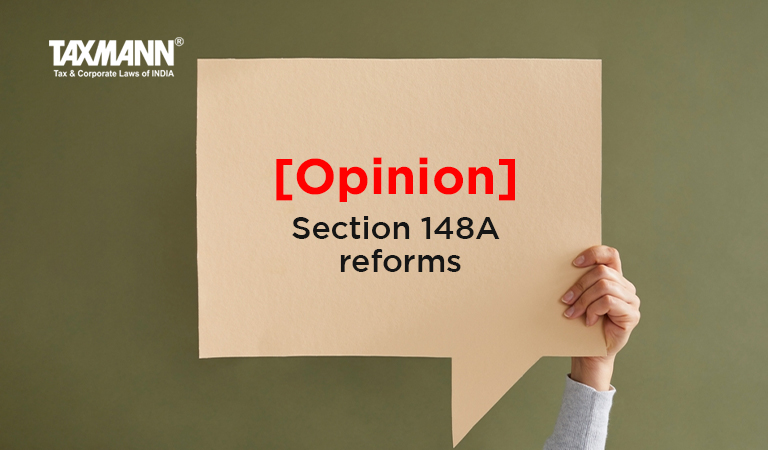[Opinion] Section 148A reforms
- Blog|News|Income Tax|
- 3 Min Read
- By Taxmann
- |
- Last Updated on 9 June, 2022

Gopal Nathani & Raji Nathani – [2022] 139 taxmann.com 117 (Article)
New section 148A is claimed to be a radical and reformist measure by the Supreme Court in a consensus order in Union of India v. Ashish Agarwal [2022] 138 taxmann.com 64/[2022] 286 Taxman 183 while dealing with old cases involving issue of 90000 notices u/s. 148 post April 2021 bypassing section 148A procedure. In paragraph 6.2 of the judgment it narrates the object behind such new provision:
“Under the substituted provisions of the IT Act vide Finance Act, 2021, no notice under section 148 of the IT Act can be issued without following the procedure prescribed under section 148A of the IT Act. Along with the notice under section 148 of the IT Act, the assessing officer (AO) is required to serve the order passed under section 148A of the IT Act. Section 148A of the IT Act is a new provision which is in the nature of a condition precedent. Introduction of section 148A of the IT Act can thus be said to be a game changer with an aim to achieve the ultimate object of simplifying the tax administration, ease compliance and reduce litigation.”
The SC counting 90000 such notices invoked Article 142 and remanded the cases for yet another refreshed procedure u/s 148A as a balancing measure to do complete justice and safeguard the interests of revenue while restoring right of the taxpayer to the metaphor of section 148A.
Now the important thing would be to wait and watch whether section 148A redeems the promise of reduced litigation or in other words whether in how many cases out of these 90000 saved notices and all other notices issued under section 148 of the unamended act, does the department drop show cause notice issued u/s 148A (a) in the initial go as a prima facie case. Though the Hon’ble Supreme Court had dispensed with the requirement of conducting any enquiry with the prior approval of the specified authority under sec 148 A (a) as a onetime measure but the time limit to issue the notice has not been dealt with. The time limit to issue the notice under both sections 148 and 148A are different. Taking note of this how many such notices will survive is a musing.
The memorandum to the Finance bill 2021 explains the introduction of section 148A by stating that the new Section 148A of the Act proposes that before issuance of notice the Assessing Officer shall conduct enquiries, if required, and provide an opportunity of being heard to the assessee. After considering his reply, the Assessing Office shall decide, by passing an order, whether it is a fit case for issue of notice under section 148 and serve a copy of such order along with such notice on the assessee. By the previous experience it is more than likely that there would not be even one drop case by the AO making it bootless errand for the assessee. In the given scenarios the purpose of sec 148A may get defeated by giving leeway to the department because of the so called bonafide belief of the officers of the Revenue in issuing approximately 90000 such notices.
It is therefore quite important that to know the statistics on such 148A (d) orders in such 90000 saved notices as only then one would know whether section 148A process has been any such reformer or just an empty formality in which case article 142 may fail in its attempt to render complete justice to the real cause in these 90000 cases.
In their recent instruction F.No.225/101/2021-ITA-II on 23.04.2022 the Central Board of Direct Taxes has admitted to cases of non application of mind or gross negligence and has therefore provided a commitment for initiation of suitable administrative action against the erring officers in case where assessments are found by the local committee to be high-pitched or where there is non-observance of principles of natural justice, non- application of mind or gross negligence of assessing officer/ Assessment Unit.
Click Here To Read The Full Article
Disclaimer: The content/information published on the website is only for general information of the user and shall not be construed as legal advice. While the Taxmann has exercised reasonable efforts to ensure the veracity of information/content published, Taxmann shall be under no liability in any manner whatsoever for incorrect information, if any.

Taxmann Publications has a dedicated in-house Research & Editorial Team. This team consists of a team of Chartered Accountants, Company Secretaries, and Lawyers. This team works under the guidance and supervision of editor-in-chief Mr Rakesh Bhargava.
The Research and Editorial Team is responsible for developing reliable and accurate content for the readers. The team follows the six-sigma approach to achieve the benchmark of zero error in its publications and research platforms. The team ensures that the following publication guidelines are thoroughly followed while developing the content:
- The statutory material is obtained only from the authorized and reliable sources
- All the latest developments in the judicial and legislative fields are covered
- Prepare the analytical write-ups on current, controversial, and important issues to help the readers to understand the concept and its implications
- Every content published by Taxmann is complete, accurate and lucid
- All evidence-based statements are supported with proper reference to Section, Circular No., Notification No. or citations
- The golden rules of grammar, style and consistency are thoroughly followed
- Font and size that’s easy to read and remain consistent across all imprint and digital publications are applied



 CA | CS | CMA
CA | CS | CMA
